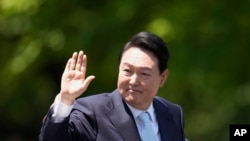South Korean President Yoon Suk-yeol used the Korean word meaning “freedom” 35 times during his first speech in office, aligning his administration with U.S. President Joe Biden’s foreign policy centered on human rights and building a coalition of liberal democratic nations, according to experts.
“The most important core value is freedom,” Yoon said on Tuesday, and it is “paramount” for South Korea and other countries that share the value of liberal democracy to meet multiple challenges around the world, including food and energy crises, global supply chain issues and armed conflicts.
Bruce Klinger, former CIA deputy division chief of Korea and current senior research fellow at the Heritage Foundation, said, “Yoon’s speech reflected his intention to have foreign policies based on principles of freedom, democracy, human rights and adherence to norms of international behavior.”
He continued, “He has made clear that, unlike his predecessor, Moon Jae-in, he will not avoid [criticizing] North Korea and Chinese human rights abuses, violations of U.N. resolutions and encroachments on the sovereignty of other nations,” referring to the Russian invasion of Ukraine.
South Korea is surrounded by the autocratic countries of North Korea, China and Russia. Seoul embraced a democratic form of government when a 1953 armistice agreement ended the fighting of the Korean War.
Evans Revere, a former State Department official with extensive experience negotiating with North Korea, said Yoon used his speech to convey a message to North Korea, China and Russia that Seoul will challenge those nations on the disregard for liberal democratic principles, including human rights.
“President Yoon’s speech strongly affirmed South Korea’s solidarity with the United States and other free, democratic countries,” Revere said.
“His remarks sent a clear message to authoritarian and totalitarian leaders in Beijing, Moscow and Pyongyang about how South Korea plans to align itself as liberal democracies push back against those powers who reject democracy and freedom,” Revere said.
Soo Kim, former CIA analyst and current policy analyst at the Rand Corporation, said Yoon’s speech was “alluding to both freedom in South Korea and abroad.”
She said, “Abroad, we are seeking democracy and the rule of law being threatened in Russia’s ongoing invasion of Ukraine. The friction between the U.S. and China also represents a juxtaposition between the two systems” of liberal democracy and autocracy.
Kim added, “At home, South Korea is also facing challenges in addressing civil liberties, most notably through some of the controversial laws pushed by the Moon administration.”
Moon was criticized for largely ignoring human rights violations in North Korea and China in his quest to achieve inter-Korean reconciliation with Beijing’s support but without upsetting Pyongyang.
Moon’s peace initiative often ran counter to the Biden administration’s efforts to rally its democratic ally to counter North Korea’s threat involving weapons tests and China’s military aggressions in the Indo-Pacific.
During the Moon government, South Korea’s parliament passed a law in December 2020 that banned South Korean activists from releasing balloons containing anti-Pyongyang leaflets into North Korea as Seoul tried to engage its northern neighbor in his peace initiative.
Robert King, who served as the special envoy for North Korean human rights issues during the Obama administration, said, “Based on [his] inauguration speech, I believe the Yoon administration will play a positive role” in human rights of North Korea. He added, “Ignoring human rights in the hope that North Korea would engage with South Korea has not worked.”
Harry Kazianis, president and CEO of the developing think tank Rogue States Project, said, “Yoon will advocate for human rights to be at the center of his foreign policy agenda.” He sees Yoon “willing to call out press freedom abuses, human suffering and lack of basic human rights in any nations he wishes – especially in North Korea.”
According to Patricia Kim, a fellow at the Brookings Institution, however, Yoon’s approach toward foreign policy based on democratic values will meet opposition.
“A shift toward a more value-based diplomacy will undoubtedly create friction between South Korea and its autocratic neighbors,” Kim said. “The Yoon administration will have to make tough policy choices in the years ahead while dealing with domestic economic difficulties, an ever-growing North Korean threat, and great power rivalry in the Indo-Pacific and European theaters.”
VOA’s Korean Service contacted the Chinese Embassy in Washington and North Korea’s Mission to the U.N. in New York City for comments on Yoon’s speech. Neither responded.
Yoon’s “freedom” speech came at a time of intense tensions on the Korean Peninsula as North Korea is ratcheting up the development and testing of its nuclear and missile programs while continuing to deprive its citizens of human rights such as the freedoms of speech, press and religion.
North Korea has conducted 16 rounds of weapons tests since January, including the latest three short-range ballistic missiles Seoul said Pyongyang launched on Thursday evening.
North Korea, which has rejected offers of COVID-19 vaccines, confirmed the first acknowledged cases of the omicron variant of the virus in the country this week.
Pyongyang said over 18,000 people show symptoms of COVID-19 as the country went into a strict emergency lockdown.
Just a day later, the official Korean Central News Agency said that six people had died, one of whom “tested positive for the BA.2 subvariant of Omicron.” The KCNA also said Friday that nearly 190,000 people were “being isolated and treated.”







